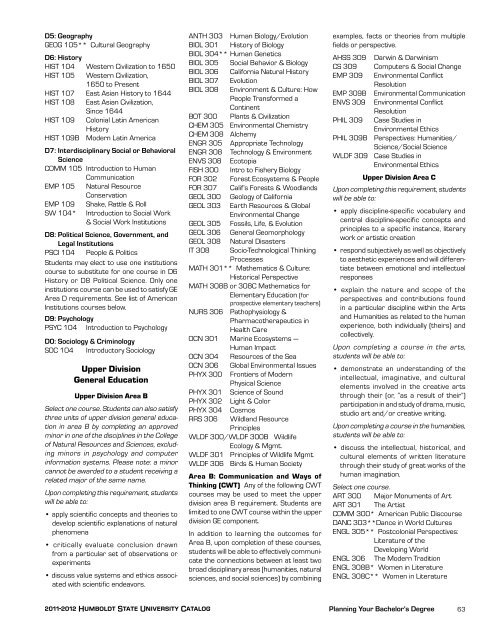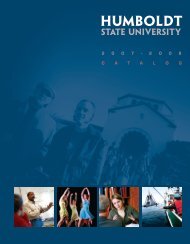2011-12 Academic Year - Bad Request - Humboldt State University
2011-12 Academic Year - Bad Request - Humboldt State University
2011-12 Academic Year - Bad Request - Humboldt State University
You also want an ePaper? Increase the reach of your titles
YUMPU automatically turns print PDFs into web optimized ePapers that Google loves.
D5: Geography<br />
GEOG 105** Cultural Geography<br />
D6: History<br />
HIST 104 Western Civilization to 1650<br />
HIST 105 Western Civilization,<br />
1650 to Present<br />
HIST 107 East Asian History to 1644<br />
HIST 108 East Asian Civilization,<br />
Since 1644<br />
HIST 109 Colonial Latin American<br />
History<br />
HIST 109B Modern Latin America<br />
D7: Interdisciplinary Social or Behavioral<br />
Science<br />
COMM 105 Introduction to Human<br />
Communication<br />
EMP 105 Natural Resource<br />
Conservation<br />
EMP 109 Shake, Rattle & Roll<br />
SW 104* Introduction to Social Work<br />
& Social Work Institutions<br />
D8: Political Science, Government, and<br />
Legal Institutions<br />
PSCI 104 People & Politics<br />
Students may elect to use one institutions<br />
course to substitute for one course in D6<br />
History or D8 Political Science. Only one<br />
institutions course can be used to satisfy GE<br />
Area D requirements. See list of American<br />
Institutions courses below.<br />
D9: Psychology<br />
PSYC 104 Introduction to Psychology<br />
D0: Sociology & Criminology<br />
SOC 104 Introductory Sociology<br />
Upper Division<br />
General Education<br />
Upper Division Area B<br />
Select one course. Students can also satis fy<br />
three units of upper division general education<br />
in area B by completing an approved<br />
minor in one of the disciplines in the College<br />
of Natural Resources and Sciences, excluding<br />
minors in psychology and computer<br />
information systems. Please note: a minor<br />
cannot be awarded to a student re ceiving a<br />
related major of the same name.<br />
Upon completing this requirement, students<br />
will be able to:<br />
• apply scientific concepts and theories to<br />
develop scientific explanations of natural<br />
phenomena<br />
• critically evaluate conclusion drawn<br />
from a particular set of observations or<br />
experiments<br />
• discuss value systems and ethics associated<br />
with scientific endeavors.<br />
<strong>2011</strong>-20<strong>12</strong> <strong>Humboldt</strong> <strong>State</strong> <strong>University</strong> Catalog<br />
ANTH 303 Human Biology/Evolution<br />
BIOL 301 History of Biology<br />
BIOL 304** Human Genetics<br />
BIOL 305 Social Behavior & Biology<br />
BIOL 306 California Natural History<br />
BIOL 307 Evolution<br />
BIOL 308 Environment & Culture: How<br />
People Transformed a<br />
Continent<br />
BOT 300 Plants & Civilization<br />
CHEM 305 Environmental Chemistry<br />
CHEM 308 Alchemy<br />
ENGR 305 Appropriate Technology<br />
ENGR 308 Technology & Environment<br />
ENVS 308 Ecotopia<br />
FISH 300 Intro to Fishery Biology<br />
FOR 302 Forest Ecosystems & People<br />
FOR 307 Calif’s Forests & Woodlands<br />
GEOL 300 Geology of California<br />
GEOL 303 Earth Resources & Global<br />
Environmental Change<br />
GEOL 305 Fossils, Life, & Evolution<br />
GEOL 306 General Geomorphology<br />
GEOL 308 Natural Disasters<br />
IT 308 Socio-Technological Thinking<br />
Processes<br />
MATH 301** Mathematics & Culture:<br />
Historical Perspective<br />
MATH 308B or 308C Mathematics for<br />
Elementary Education (for<br />
prospective elementary teachers)<br />
NURS 306 Pathophysiology &<br />
Pharmacotherapeutics in<br />
Health Care<br />
OCN 301 Marine Ecosystems —<br />
Human Impact<br />
OCN 304 Resources of the Sea<br />
OCN 306 Global Environmental Issues<br />
PHYX 300 Frontiers of Modern<br />
Physical Science<br />
PHYX 301 Science of Sound<br />
PHYX 302 Light & Color<br />
PHYX 304 Cosmos<br />
RRS 306 Wildland Resource<br />
Principles<br />
WLDF 300/WLDF 300B Wildlife<br />
Ecology & Mgmt.<br />
WLDF 301 Principles of Wildlife Mgmt.<br />
WLDF 306 Birds & Human Society<br />
Area B: Communication and Ways of<br />
Thinking (CWT) Any of the following CWT<br />
courses may be used to meet the upper<br />
division area B requirement. Students are<br />
limited to one CWT course within the upper<br />
division GE component.<br />
In addition to learning the outcomes for<br />
Area B, upon completion of these courses,<br />
students will be able to effectively communicate<br />
the connections between at least two<br />
broad disciplinary areas (humanities, natural<br />
sciences, and social sciences) by combining<br />
examples, facts or theories from multiple<br />
fields or perspective.<br />
AHSS 309 Darwin & Darwinism<br />
CS 309 Computers & Social Change<br />
EMP 309 Environmental Conflict<br />
Resolution<br />
EMP 309B Environmental Communication<br />
ENVS 309 Environmental Conflict<br />
Resolution<br />
PHIL 309 Case Studies in<br />
Environmental Ethics<br />
PHIL 309B Perspectives: Humanities/<br />
Science/Social Science<br />
WLDF 309 Case Studies in<br />
Environmental Ethics<br />
Upper Division Area C<br />
Upon completing this requirement, students<br />
will be able to:<br />
• apply discipline-specific vocabulary and<br />
central discipline-specific concepts and<br />
principles to a specific instance, literary<br />
work or artistic creation<br />
• respond subjectively as well as objectively<br />
to aesthetic experiences and will differentiate<br />
between emotional and intellectual<br />
responses<br />
• explain the nature and scope of the<br />
perspectives and contributions found<br />
in a particular discipline within the Arts<br />
and Humanities as related to the human<br />
experience, both individually (theirs) and<br />
collectively.<br />
Upon completing a course in the arts,<br />
students will be able to:<br />
• demonstrate an understanding of the<br />
intellectual, imaginative, and cultural<br />
elements involved in the creative arts<br />
through their (or, “as a result of their”)<br />
participation in and study of drama, music,<br />
studio art and/or creative writing.<br />
Upon completing a course in the humanities,<br />
students will be able to:<br />
• discuss the intellectual, historical, and<br />
cultural elements of written literature<br />
through their study of great works of the<br />
human imagination.<br />
Select one course.<br />
ART 300 Major Monuments of Art<br />
ART 301 The Artist<br />
COMM 300* American Public Discourse<br />
DANC 303**Dance in World Cultures<br />
ENGL 305** Postcolonial Perspectives:<br />
Literature of the<br />
Developing World<br />
ENGL 306 The Modern Tradition<br />
ENGL 308B* Women in Liter ature<br />
ENGL 308C** Women in Liter ature<br />
Planning Your Bachelor’s Degree<br />
63

















